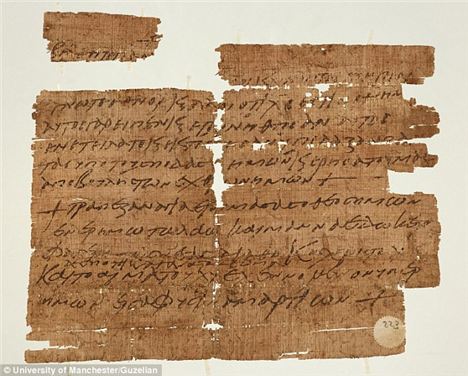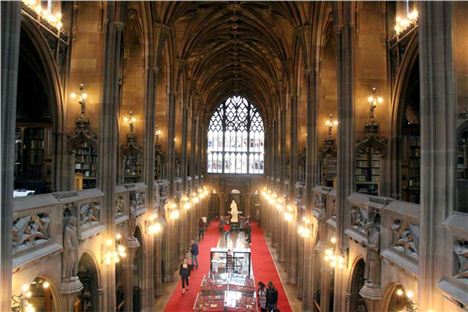A RESEARCHER at the University of Manchester has come across an incredibly rare artefact in the archives of John Rylands Library - and it could contain the earliest ever reference to the Last Supper.
"It is a text which was probably inscribed by a monk or a priest to protect the bearer from any kind of evil. This piece of papyrus would have been folded and suspended around their neck, either just with string or in a nice locket."
Since 1901, the document had been tucked away and mostly forgotten about until Dr Roberta Mazza, an Italian-born lecturer and author in Classics and Ancient History, rediscovered the 1,500-year-old artefact in the vaults of the University library on Deansgate whilst poring over thousands of historical fragments.
The papyrus (an Ancient Egyptian paper made from plant reeds), written in Greek, is one of the world's earliest surviving 'Christian charms' - originally worn for good luck and to protect the owner from evil.
 The papyrus (image courtesy of the University of Manchester)
The papyrus (image courtesy of the University of Manchester)
The document is thought to contain the earliest ever reference to the Last Supper and contains biblical passages from the books of Psalms and Matthew.
Oddly, the other side of the ancient text appears to have been used as a tax receipt. It appears recycling and 'going green' is no modern fad.
Dr Roberta Mazza told BBC's North West Tonight:
"It is a text which was probably inscribed by a monk or a priest to protect the bearer from any kind of evil.
"This piece of papyrus would have been folded and suspended around their neck, either just with string or in a nice locket."
A passage from the text reads:
'Fear you all who rule over the earth, know you nations and peoples that Christ is our god.
'For he spoke and they came to being, he commanded and they were created; he put everything under our feet and delivered us from the wish of our enemies.
'Our God prepared a sacred table in the desert for the people and gave manna of the new covenant to eat, the Lord's immortal body and the blood of Christ poured for us in remission of sins.'
Mazza added: “Though we know almost nothing about the owner of the charm, we think it could have been owned by a resident of the village nearby Hermoupolis (el-Ashmunein).
"We can say this is an incredibly rare example of Christianity and the Bible becoming meaningful to ordinary people - not just priests and the elite."
Rachel Beckett, Head of Special Collections at University of Manchester Library and Associate Director of the John Rylands Research Institute said:
“This is a truly remarkable discovery, and clearly demonstrates the strength and global significance of the library’s collections.
"It also demonstrates the value of close collaboration between library staff and academic colleagues, helping us to reveal the riches of the Rylands which is home to many of the finest collections of rare books, manuscripts and archives in the world.”
Details of this discovery are being unveiled for the first time at a conference on Thursday 4 September at The John Rylands Library.













